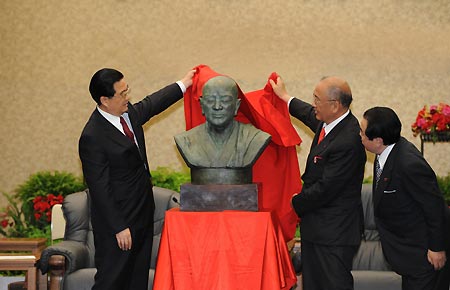
Visiting Chinese President Hu Jintao (L) and Nara
Prefecture Governor Shogo Arai (2nd R) unveil the statue of Great Master
Jianzhen (Ganjin Wajyo) (688-763), a prominent Buddhist monk of the Tang Dynasty
of China (618-907), in Nara, Japan, May 10. - Xinhua
Chinese President Hu Jintao's just-concluded "warm spring" visit to Japan has
opened up new prospects for the development of strategic and mutually beneficial
relations between the two countries, Chinese Foreign Minister YangJiechi said on
Saturday.
During his state visit, the first by a Chinese president to Japan in a
decade, President Hu held fruitful talks with Prime Minister Yasuo Fukuda, Yang
told Chinese journalists accompanying Hu on the tour.
During his stay in Japan from May 6-10, Hu met with Japan's Emperor Akihito,
leaders of both houses of parliament and political parties of Japan, as well as
old Japanese friends of China, and had extensive contacts with leaders of
economic circles, representatives of friendly organizations, young people and
people from other walks of life.
The five-day visit, made with a pragmatic approach, has achieved great
successes and produced the desired results.
The Japanese government attached great importance to President Hu's visit,
Yang said. Emperor Akihito, Prime Minister Fukuda and House of Representatives
Speaker Yohei Kono attended many events of Hu's itinerary, and the Chinese
president's visit was greeted with great enthusiasm by the Japanese public, he
said.
BLUEPRINT FOR SINO-JAPANESE RELATIONS
During the visit, President Hu and Prime Minister Fukuda issued a six-point
joint statement on all-round promotion of strategic and mutually beneficial
relations between the two countries. The statement has become the fourth
important document between the two countries, with the other three being the
China-Japan Joint Statement issued on Sept. 29, 1972, the China-Japan Treaty of
Peace and Friendship signed on Aug. 12, 1978, and the China-Japan Joint
Declaration released on Nov. 26, 1998.
The statement confirms the guiding principles for long-term development of
Sino-Japanese relations, and is of great significance to consolidating the
political foundation of bilateral ties, promoting strategic mutual trust,
building an overall framework for a long-term, healthy and stable development of
China-Japan ties, and deepening bilateral strategic and mutually beneficial
relations, he said.
The two sides also issued a joint press communique on boosting bilateral
exchanges and cooperation, covering 70 cooperation projects between the two
countries.
Both sides confirmed that China and Japan are cooperation partners, with
neither side posing any threat to the other, and that they will support each
other's peaceful development, handle issues existing between the two countries
through dialogue and negotiations, increase high-level and political exchanges,
build a mechanism for high-level regular visits between leaders of the two
nations, strengthen communication and dialogue between the governments,
parliaments and political parties of the two countries.
ECONOMIC AND TRADE COOPERATION
The visit has helped deepen economic and trade cooperation between China and
Japan.
During the visit, President Hu stressed that China and Japan are one of the
most important trading partners for each other and that the two economies are
highly complementary to each other. He called for efforts to open new key areas
of cooperation.
Hu laid stress on cooperation in energy saving and environmental protection
and called for increased cooperation between enterprises of the two countries,
in regional and global economic affairs in particular.
The visit has borne fruits in the fields of energy saving technology, sewage
disposal and the development of a recycling economy in urban areas, with both
sides witnessing the exchange of notes on seven cooperation agreements.
The two sides also agreed to push forward full cooperation in the fields of
finance, information, trade, investment, small- and medium-sized enterprises and
intellectual property rights protection.
Both sides vowed to continue dialogue at the ministerial level to explore
ways of developing energy cooperation.
STRENGTHENING PERSONNEL, CULTURAL EXCHANGES
Hu pointed out that broadening personnel and cultural exchanges is the most
effective and reliable way of deepening mutual understanding and friendship
between the two peoples, Yang said.
Delivering a speech at Waseda University, Hu said the future of the
Sino-Japanese friendship rests on the youths of the two countries.
CONSENSUS, COOPERATION IN REGIONAL, INTERNATIONAL AFFAIRS
President Hu noted that the two countries' coordination and cooperation are
indispensable to the rejuvenation of Asia, Yang said.
Hu said both China and Japan should make contributions to Asia's revival, and
work together to cope with global challenges and build a harmonious Asia and
world, according to the Chinese foreign minister.
The two sides pledged joint efforts to maintain peace and stability in
Northeast Asia and facilitate the process of six-party talks, Yang said.
The two sides agreed to strive to promote regional cooperation in East Asia
and contribute to building a peaceful, prosperous, stable and open Asia, in line
with the principles of openness, transparency and tolerance, he said.
The two sides agreed to strengthen cooperation in the fields of climate
change and environmental protection.
The two sides decided to cooperate in coping with climate change after 2012
within the framework of the United Nations Framework Convention on Climate
Change, as well as in line with the principle of "common but differentiated
responsibilities and respective capabilities" and the Bali Roadmap, he said.



